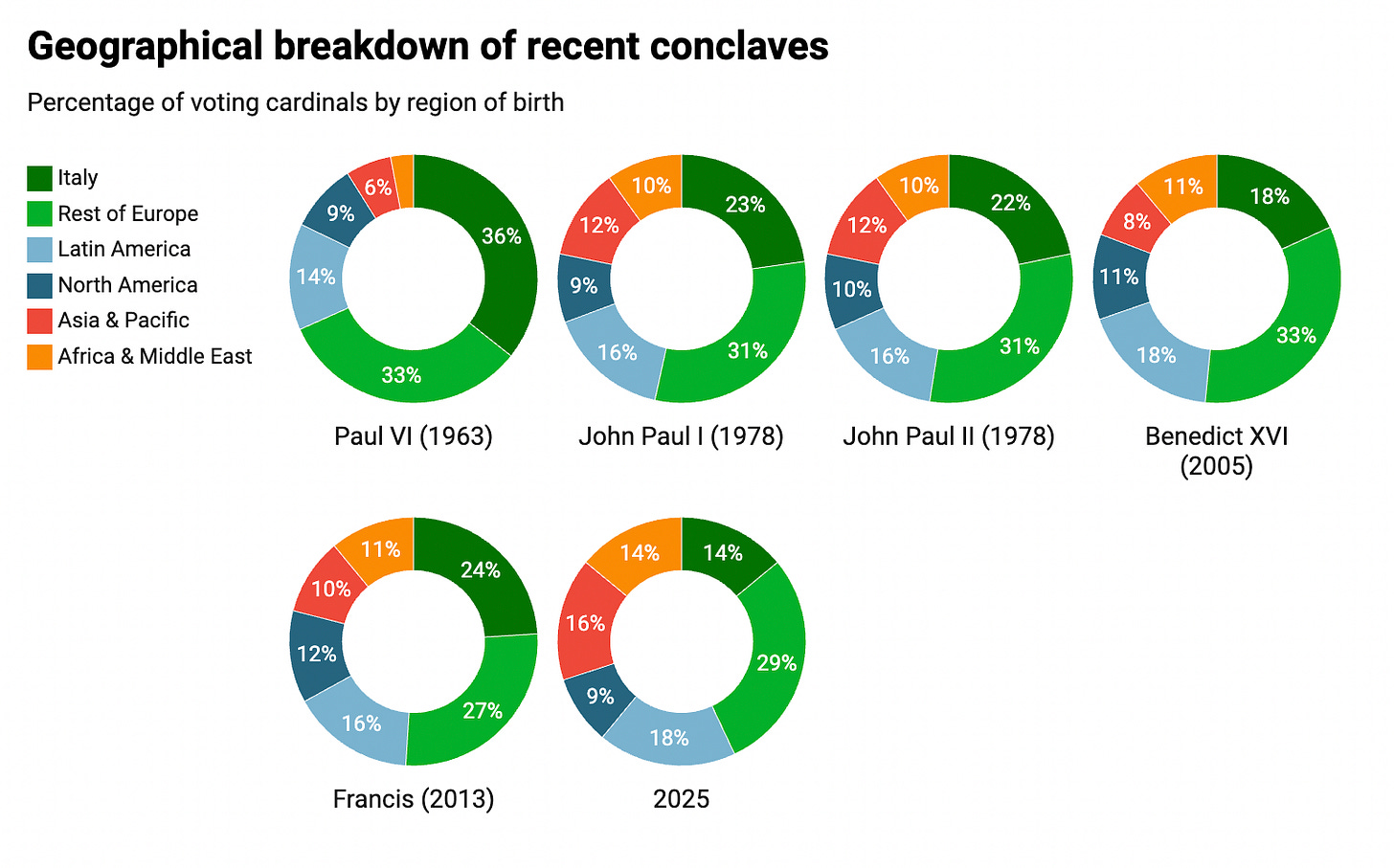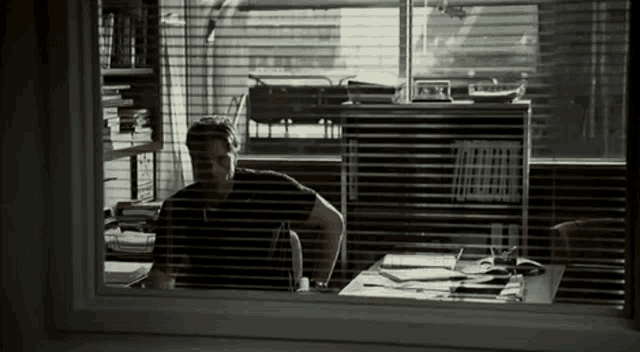Happy Friday friends,
I am in Rome. The papal funeral is tomorrow, and it’s crowded here.
At least where I am.
“Where I am” is the lobby of the Vatican press office, which seems to be struggling a bit under the sheer volume of journalists trying to collect their accreditation.
It is a delightfully simple system. A modest-sized folding table with several hundred passes laid out in a rough approximation of alphabetical order, which a cleric in a brown leather jacket sifts through balefully, asking you to stop if you see your name. Eventually, someone loses patience and cuts the line to start rifling through the cards themselves and then Babel breaks loose before order’s resemblance is restored.
After a certain number of attempts, you’re asked to write your name down and wait while they print you another, which I guess is easier than finding the one they already made. I’ve been waiting for two hours now. The machine is broken, I am told.
Outside, the square is crowded, but the line into St. Peter’s for people to pay their last respects to Pope Francis seems to lengthen and contract considerably, with no real rhyme or reason.
In the middle of the afternoon yesterday, the total waiting time was about 20 minutes. But last night at 11 p.m., there was a line snaking from the San Uffizzio gate around the corner and behind the Paul VI Hall.
In general, the mood of the crowd is rather mixed, ranging from the clearly devout and devoted, to those who need to be reminded that they can’t take their ice cream into the basilica.
It is ever thus in Rome.
Yesterday, I overheard a group of Scottish tourists debate going in.
They were concerned that only Catholics might be allowed in St. Peter’s Basilica at all.
One of their number, presumably a Protestant, was concerned the Swiss Guard might check to be sure the pilgrims were Catholic — though they debated how that could be practically accomplished.
And then another of their party settled the issue, by saying he was “nae buying tickets to see a dead pope anyway.”
His granny wouldn’t approve, he said.
Speaking to mourners over the last couple of days, many — if not most — seem to say they were planning to be in Rome already, for Easter or Jubilee pilgrimages, or for one of the delayed canonizations, only to find themselves waking a pope instead.
They all report a similar feeling, of having been surprised by history.
I’m not sure what kind of crowds the funeral will see tomorrow, but they are planning for big numbers, that much is clear.
Away from the main square, Rome obviously continues as always. And the great joy of the city, apart from the food, is that you are never more than 100 yards from a nearly empty place to pray.
Remembering to pray, odd as that might seem, is often the hardest part of working big events like this. There is a lot to cover, a lot to coordinate, everywhere is crowded, nothing works, everyone is tired.
But the real story, at least for the next two days, is that our pope, Francis, and our brother, Jorge, has gone to meet the Lord and needs our prayers.
Here’s the other news.
The News
We’re mounting a full-court press this week, and we will keep it up until the white smoke rises.
We will have more articles later today specific to tomorrow’s funeral, and we’ll be covering the event from every possible vantage point. So do check in to catch it all.
And in addition to all our usual coverage, from next week, as the general congregations continue and the conclave preparations get underway in earnest, we’ll be launching a special “Smoke Signals” analysis for paid subscribers, bringing you regular coverage of what we’re hearing on the Borgo, who and what to watch, and how the voting might shake out.
So sign up if you haven’t yet, and stay tuned.
—
As preparations for the funeral of Pope Francis enter their final hours, controversy has erupted over the involvement of Cardinal Roger Mahony in the ceremonials.
Despite the (generally justified) criticisms of his time in office, and outcry from victims’ advocates, Mahony has never shown any signs of retiring from public life, or caring much about whom that offends.
Even after his successor, Archbishop José Gómez moved to restrict the cardinal’s public ministry in LA, Mahony has remained a regular fixture at major Church events, both in Rome and the U.S. and, as a cardinal, there is little anyone can do to keep him away.
Indeed, as we reported this morning, his involvement in the papal funeral isn’t so much a question of his being “selected” to fill a special role, but rather his simple seniority as one of the oldest living and longest serving cardinals.
You can read all about the story here.
—
Francis, as we all know, specified in his will that he is to be buried not in St. Peter’s Basilica but in the Basilica of Santa Maria Maggiore, which he visited often to bookend his papal trips.
While Francis’ choice is a departure from recent his most immediate predecessors, he’s certainly not the first pope to be interred in Maria Maggiore, and by no means is it the most unexpected place for a pope to be laid to rest.
Here’s a look at five of the most unusual papal burial places.
—
As you might expect, the death of a pope provokes a lot of reflection.
It's not about trying to save face or whitewash Francis’ time in office, Fr. Arturo Sosa said, but about an honest reckoning and learning from what needs to be done better.
Meanwhile, our own Pillar columnist Daniel Lipinski reflected this week on Francis and dialogue — and he points out, it is an overused and much abused term.
—
Of course, not all communication — however sincere — is dialogue. And Francis had no time for whiners, as we learned this week when a photo emerged of his private rooms being sealed.
There on the door to Francis’ apartments, in big red letters, was a sign saying as much: “Vietato Lamentarsi” — literally, no whining.
—
Disgraced Cardinal Angelo Becciu is back in the news this week, insisting that he must be admitted to the coming conclave, despite being a convicted criminal in Vatican City, and having resigned his rights as a cardinal several years ago.
I’ll tell you what I make of it all in a minute.
—
Cardinal Becciu’s attendance to one side, the composition of the coming conclave is certainly a point of public interest.
Where are the cardinal electors coming from, who appointed them, how old are they — it’s all worth weighing and sifting to understand who the men are who will pick the next pope.
—
There is going to be a lot of Church jargon spoken over the next few weeks.
You’re going to hear and read a lot of people speaking knowingly but not necessarily knowledgably about general and particular congregations, the college of cardinals, the camerlengo, and a whole host of other terms which only ever get a good airing during an interregnum.
—
One thing most people know is that, following the death of the pope, all the cardinal prefects of the various curial dicasteries cease from office, until the new pope reconfirms them.
But do they all, really? And surely the whole Vatican doesn’t grind to a total halt during the sede vacante period — someone must be going to work, right?
Well, yes. In fact most of the Vatican’s departmental staff will be back at work next week.
—
And if you need to take a breather from all the papal funeral and pre conclave coverage, I don’t blame you. It’s a lot.
The straightforward lessons of “A Few Good Men” and “The Martrix” read very differently to younger watchers, it seems.
And they can’t handle the truth.
This is the palate cleanser you want.
The Becciu Test
Pillar reader Cardinal Angelo Becciu has, almost inevitably, made something of a spectacle of himself this week, insisting, variously, that Pope Francis wanted him to be in the conclave, promised him it would be fine, or would have, if he had had time.
From what I am hearing around the general congregations, he’s certainly something of a talking point.
I have heard conflicting accounts of Cardinal Parolin, the senior cardinal elector, saying that Francis had given two written and absolute nos on the matter, while Cardinal Giovanni Battista Re being in favor of Becciu being allowed to vote, and the Camerlengo Cardinal Kevin Farrell saying Francis had told him Becciu was out.
All of this or none of it may be exactly true. Public clarity on this is rather lacking for the time being. And, at least some are arguing, the legal clarity is lacking, too.
As you might expect, the manner in which Francis chose to deal with Becciu, along with a few other appointments and actions which I looked at, do not exactly line up with the norms for a papal interregnum and conclave.
Superficially, this does appear to create some doubts, though I would argue the Church’s mechanisms and methodologies of legal interpretation are sufficiently established that clear and coherent conclusions can be drawn.
The problem is, however obvious the answers to questions like those raised by Becciu’s case may be to canonists and cardinals, that isn’t the same thing as anyone having the official status to give them.
In the end, this is going to come down to a handful of senior cardinals — Parolin and Farrell most especially — and their ability to carry the college with them, even while accepting the cardinals don’t actually have the authority to make a determination here, because no one does.
This boils down to a question of personal leadership. And it is a real and fascinating test for some of the would-be future popes.
It also illustrates all too acutely what happens when the rule of law is set on the back burner, and the dangers of treating legal coherence in the Church as some kind of pharisaical anachronism.
Whoever emerges on the loggia in a few weeks time may do well to consider the need to, you know, make canon law great again.
Pope Francis and the Freemasons
Among all the tributes to Pope Francis which have poured in from around the world, perhaps the most unexpected I have read came from the Grand Lodge of Italy of the Ancient, Free, Accepted Masons, who joined the “universal mourning” for Francis, whom they credited with “changing the Church” and “embodying the values of brotherhood, humility, and the search for planetary humanism.”
According to the Grand Lodge, “In this moment of mourning, our communion intends to pay homage to the vision of Pope Francis, whose work is characterized by a profound resonance with the principles of Freemasonry.”
You can imagine the kind of field day the Twitter conspiracy theorists and YouTube grifters are going to have with that one.
But Pope Francis has been associated often with Masons, almost from the get-go. And you might not realize, but the pope had thoughts about Freemasonry.
And so do I.




